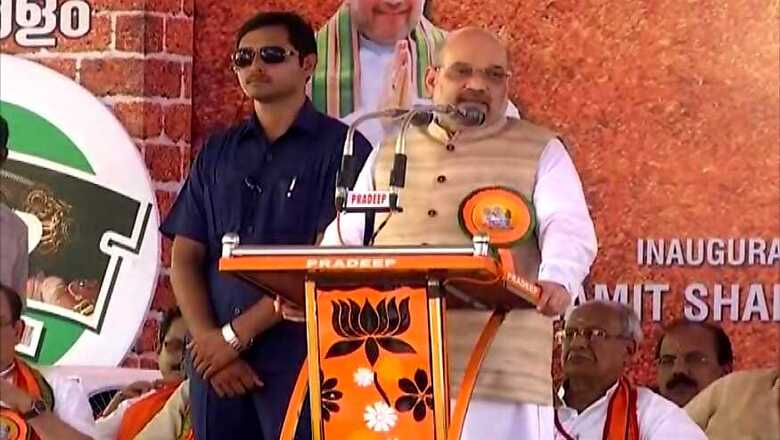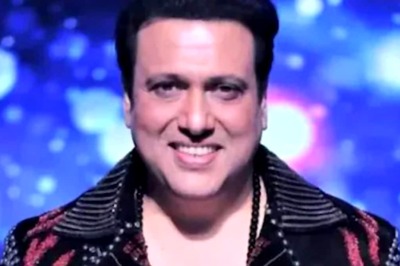
views
Kerala's critics often comment that the state is a tourist destination because of the many "yatras" that take place throughout the year. If people are not journeying 'to' the state they are journeying 'within'. Such internal journeys also embody Kerala's inner struggle to come to terms with its many paradoxes and frustrations. If it is not a yatra for environment, it is a yatra to close down a polluting factory. If it is not a yatra for a politician to emphasise his emergence, it is a yatra for a national politician to announce his imminent victory in the polls. Yatras are taken out both by the vanquished and the victorious as if such Yatras are an end in themselves, albeit a journey that never ends.
To one of these categories belong the Jan Raksha Yatra (People's Protection March) led by the BJP National President Amit Shah flagged off from the northern point of Kerala today (October 3) and will end in the southern most point of the state on October 17. Shah will be present on the first day and the last and during the intevening period he will be making many speeches and exhortations and clarion calls in Gujarat and Madhya Pradesh, both going to elections soon.
Union HRD minister Prakash Javadekar is leading a phalanx of central ministers who will be in Kerala during the Yatra, which will make it the largest concentration of BJP leaders in Kerala at any time in the recent past. It is a state which the BJP had given up for 'lost' long time back, but Shah is not willing to give it up without some serious effort. "The CPI(M) is desperate and on a killing spree. It is doing murder politics in its desperation and people, including from the CPI(M), are joining the BJP. We will use democratic means to answer its violence," Javadekar told a press confernce on Gandhi Jayanthi, October 2. In answer, chief minister Pinarayi Vijayan has said the people know what the RSS-BJP really does and that Shah's party will be rebuffed.
BJP's first major assault on Kerala during the last state elections resulted in just one seat, but it raised its vote share to 15% from about 6% which is a commendable effort. Amit Shah's strategy at that time was to split the Ezhava (affluent OBC caste) vote and align it with a so-called Ezhava party BDJS, formed expressly for this purpose by Vellapally Natesan who controls many Ezhava socio cultural organisations. This Ezhava-woooing strategy backfired badly and apart from the new party BDJS, Natesan's assiduously built reputation as a King-maker also lay in tatters. No wonder he now wants to quit the BJP alliance and the NDA.
In fact there was an Ezhava consolidation in favour of the CPM which was always seen as a Ezhava party. The reason was two fold: the liquor policy of the UDF (gradually tapering of liquor sales) was going to hurt the Ezhavas and two, the Ezhavas felt that the Muslims were making inroads into many of their business interests in central and south Kerala. This added to the overall perception that the UDF government was pro-minority (Christian and Muslim ministers dominated) and so the upper castes too in many pockets voted for the CPM. Kerala's Hindus never considered BJP as a viable political alternative and compounding the irony, voted for the Left Front perched at the other end of the political spectrum. To add to the irony or paradox, the Nairs (who have many RSS supporters) too decided that first they will have to take care of the rise of Muslim affluence and then later think of BJP. The situation hasn't changed much now for the Kerala Hindu to suddenly embrace the BJP in big numbers.
It is this huge divide or gap in perception that the Amit Shah yatra hopes to bridge. That the Kerala Hindu has no real affiliation with the BJP's national interests or 'hidden agenda' (Cow, Hindi, Gujarat, Hindu Rashtra, destablising Congress or CPM governments) is a problem the BJP has to confront when trying to position itself as the Third Force. What does it have to offer Kerala? A state without beef and alcohol and the gradual propagation of Hindi is unimaginable to the Kerala Hindu who loves his temples and its festivals but has never moved outside the strict confines of Nehruvian socialism and Constitutional strictures. In fact the present Congress is more socialist that the CPM itself whose chief minister is trying to sell off dead state properties like Aluminium factory in Kundara, Kollam, and maybe rightly so.
The BJP yatra is trying to project the CPM as a Maoist party which indulges in killings of its political opponents. This is terribly old wine in a old bottle, tired many years over by the Congress since the killing stretches back to two decades. The CPM cadres have also killed its own rebels. The RSS has also not been lacking in strength in retaliatory killings. As if that was not enough the RSS strengthened its love-jihad campaign in Kerala, resulting recently in the confinement of 24-year-old Hindu convert to Islam whose case the Supreme Court is hearing. It is true that various Islamist hardliner groups are running institutions of dubious nature in north Kerala. So the BJP-RSS now have to fight on two fronts: Against Islamist forces and against the CPM, two of the most entrenched powers in the state. It is a two-pronged task that is bound to fail both short term and midterm. Also because polarising the Hindu vote, the tested Amit Shah strategy, has not worked in Kerala.
In the land of yatras it is no surprise that another yatra is on the way to get the 24-year-old converted girl Hadiya released from custody. This 'Chalo Kerala' March is moving in the opposite direction to the Jan Raksha Yatra. The two yatras collide not just on the streets but in the Kerala's febrile argumentative space which now is in turmoil with Shah and his Hindutva brigade trying to plant yet another political idea in that fertile soil.

















Comments
0 comment